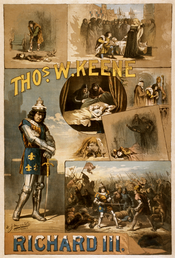Richard is certainly an evil character, a fact made clear throughout the play. The extent of his evil is shown in events including the death of Clarence and his treatment of Anne,. This considered, I still don't believe that he is truly evil. He has justification for his actions, and he later is haunted by his actions as he questions whether he has made the right decisions. I believe that Richard is evil, but not truly evil, and that his actions were justified, if only in his mind.
Richard has justification for his actions, which he reveals to the audience at various points in his soliloquies. In his opening soliloquy he states
'Why, I in this weak piping time of peace,
Have no delight to pass away the time,
Unless to spy my shadow in the sun
And descant on mine own deformity.' (Act 1, Scene 1, Lines 24-27)
With this statement, he reveals his motivation and justification for his actions in the rest of the play.
As a result of his deformity, he feels that he cannot partake in the fun and pleasures of living in peacetime, and from this concludes:
'since I cannot prove a lover
To entertain these fair well spoken days,
I am determined to prove a villain.' (Act 1, Scene 1, Lines 28-30)
Richard's desire for the duration of the play is to become king. His evil actions throughout the play are focused on removing all obstacles in the way of his gaining the throne. He uses this desire as a way of justifying his actions, and removing himself from the horrors of what he is doing. I believe that Richard had justification for his actions, even if his justifications seem repulsive to those viewing the play.
Richard's first display of the extent of his...



'Richard is a truly evil character with no justification for his actions'. To what extent do you agree with this assessment of Richard's character in Shakespeare's Richard III?
Allthough this is a considerable short piece of writting on a extensive subject, i feel you have done it very well.
You did leave out some miner parts about Richards personality that im sure would have helped this essay. Yet it was a good piece considering how short it was and i want to telly ou that it is a very good piece. So keep up the good work!
4 out of 4 people found this comment useful.